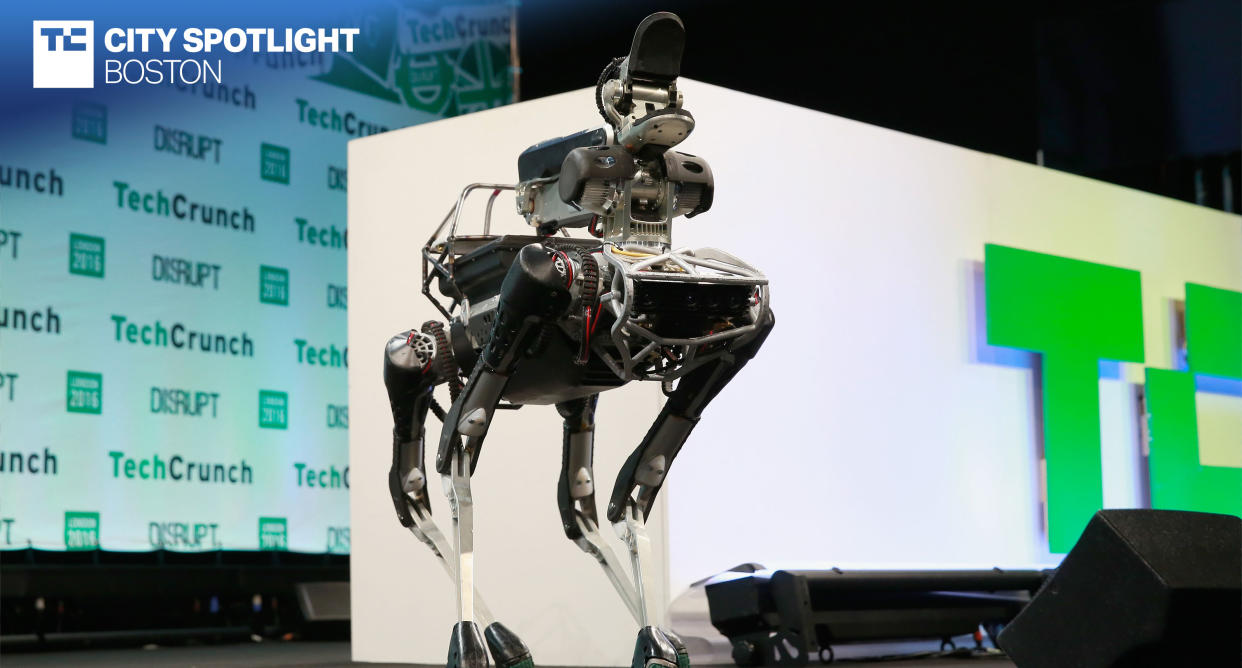Putting the Boston in Boston Dynamics

When you name your company Boston Dynamics, certain geographical constraints are inserted into the operation. While the Spot-maker is, by many accounts, a global brand, it’s one that remains deeply tied to Massachusetts, even as it’s changed hands between owners in California, Japan and, most recently, South Korea.
Headquartered a dozen miles outside of downtown Boston in Waltham, Massachusetts, the robotics firm’s roots are firmly planted in Beantown.
“I grew up in New Jersey, but my mother grew up here so I had a connection to Boston from a very early age,” founder and chairman Marc Raibert said in an interview at a TechCrunch City Spotlight event. “I love Boston. I went to school here, left for 10 years, and eventually was faculty at MIT. I was a professor there for 10 years before starting Boston Dynamics. When we started, it was halftime Boston Dynamics, halftime MIT.”
It's a connection the company has only further leaned into in recent years, perhaps most notably in the form of a 2022 local Super Bowl ad that found Sam Adams’ Boston Cousin character partying at Boston Dynamics HQ with assorted robots.
Raibert, who currently runs the somewhat loosely affiliated Hyundai-funded Boston Dynamics AI Institute in Cambridge’s Kendall Square, notes that he left town for about a decade before the company’s founding. He spent that time working at Carnegie Mellon in Pittsburgh and California’s Jet Propulsion Laboratory.
“It was fledgling, but they had a mockup of a Mars rover back in the 70s,” he says of his time at JPL. “It looked like a car, and it had the old Stanford arms that had a sliding joint. It had some cameras, and there were a couple of different groups working on it.”
Raibert isn’t alone in that exodus, of course. Brain drain has been a long-standing concern for university cities like Boston, with many startup founders and other talent opting to leave for places like the Silicon Valley and New York. In spite of the lure, however, he explains that the phenomenon hasn’t been a major issue for Boston Dynamics, when it comes to recruiting.
“I don't think we've lost too many people to the West Coast,” says Raibert. “Sometimes that happens. When we were part of Google, there was a group of us from Boston Dynamics who moved out to the West Coast, and I think most of those people stayed. When we got out of Google, they didn't come back with us. But Boston has its own charms and attraction, and there's lots of tech here. Lots of schools doing good stuff.”
Announced in August of last year, the AI Institute gets back to Raibert and Boston Dynamics’ research roots. It’s a move away from the company’s shift toward productization in recent years, which found it bringing products like Spot and Stretch to market. While Hyundai is currently the institute’s only stockholder, Raibert says there’s currently no push to productize its research for either the carmaker or its namesake robotics firm.
“You never know until later what the staying power is,” he explains, pragmatically. “Right now, my pitch is to avoid products, because products force you into quarterly and annual work. Products force you into all the various needs of all the various customers. They have a lot of good information, but they also take you in lots of directions. If you want to do the vision of what's going to come next, it has to come from the technical people who are developing it. I proudly say we're not doing products. No one's trying to steer me at the moment.”
There are plenty of options for the Institute’s future patents and other IP, including the possibility of developing its spinout startups.
“We have a multi-prong plan,” he adds. “We can do spinouts. For some, spinouts are seen as a way to commercialize. For me, it’s a way to protect the institute from products.”

